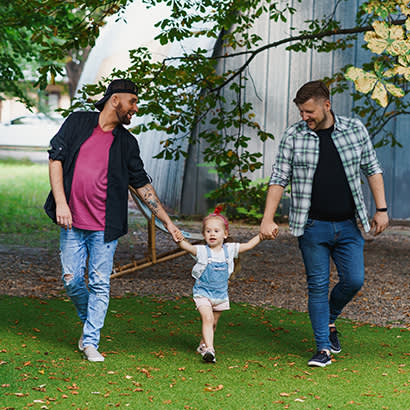
For an enhanced digital experience, read this story in the ezine.
As park and recreation professionals, it is our duty to provide safe spaces and programming for all members of our community. While as a profession we have made strides in offering more inclusive spaces for the LGBTQ+ (lesbian, gay, bisexual, transgender and queer) community, there is still more work to be done. Research shows that lack of physical and social opportunities contributes to health issues among LGBTQ+ persons, positioning park and recreation agencies as leaders in the community that can offer inclusive spaces and program opportunities.
As professionals, we commit to offering welcoming and safe environments for our program participants. Yet, agencies sometimes struggle to communicate that mission to the LGBTQ+ community. There are several steps an agency can take that have the potential to provide a large and lasting impact, ranging from more inclusive messaging on promotional materials and social media posts to facility improvements, such as gender neutral and/or unisex restrooms. However, before taking any of these steps, professionals need to understand what it truly means to be a safe space.
Cultivating Awareness and Allyship
Enter the Safe Zone Project. The Safe Zone Project is a free training resource for cultivating effective LGBTQ+ awareness and allyship and should be a best practice used in park and recreation agencies. You may have seen a sticker or sign that says, “Safe Zone” or “Safe Zone Trained.” Most often, these indicate that the person displaying the sticker or sign has gone through a Safe Zone training and wants to communicate that they are open to talking about and being supportive of LGBTQ+ individuals and identities. However, sometimes, these are a simple form of communication that says, “I’m an ally!”
Safe Zone trainings allow people to deepen their understanding of LGBTQ+ identities and issues and give participants tools to foster more inclusive spaces. Trainings give participants familiarity and comfort with vocabulary and inclusive practices, an understanding of privilege, and can help participants identify ways their organization can be a safe and inclusive space for the community.
Safe Zone trainings are designed with everyone in mind. While workshops will assist straight and cisgender people in learning how to be better allies, many LGBTQ+ participants enjoy having the opportunity to learn more about how to be better allies to those within the community and more about identities and systems they may not otherwise be aware of.
Additional Resources
Safe Zone trainings usually are offered through local schools and universities, as well as through local LGBTQ+ community outreach centers. There also are resources for trainings that can be done virtually or as workshops at conferences, such as the NRPA Annual Conference. The Safe Zone Project also offers self-guided online courses, so the possibilities are endless. With more than 25,000 educators in 100 countries, chances are there is a trainer near you.
The Safe Zone Project also offers a free online facilitator training guide and training packet that can be downloaded and used within your organization. For some agencies, it may mean a day-long intensive training. For others, it’s a 45-minute vocabulary lesson. Regardless of how an agency chooses to tackle training, it’s a big step toward creating a more inclusive space for your community.
Park and recreation agencies have a unique opportunity to directly impact the LGBTQ+ community in a positive and healthy way through a variety of physical activity and social interaction programs and offerings. Raising awareness among and providing training to staff are great first steps to better promote inclusion. Being mindful of inclusive best practices for our LGBTQ+ community is a vital way for ensuring the benefits of parks and recreation are realized by everyone we serve.
Hillary Roemersberger, CPRP, AFO, is Director of Recreation Services at Apex Park and Recreation District.

